

8 Ways Managers Sabotage Themselves. It's amusing to watch employees straight out of college (or from particularly large corporations) come to work at my company.
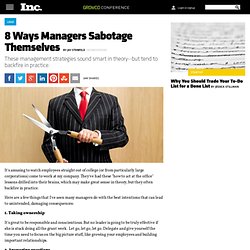
They've had these "how to act at the office" lessons drilled into their brains, which may make great sense in theory, but they often backfire in practice. Here are a few things that I've seen many managers do with the best intentions that can lead to unintended, damaging consequences: 1. Taking ownership It's great to be responsible and conscientious. 2. As a leader, it's important to be available for ongoing guidance. High-Performance Coaching - Team Management Training from MindTools. Achieving Full Potential Helping people to reach their full potential.
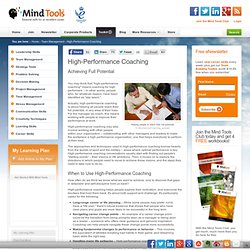
What is Coaching? - Management Training from MindTools. How to be an Effective Coach Coaching is great for developing people's skills and abilities. © iStockphoto/peepo You've probably heard people talking about coaching in the workplace.
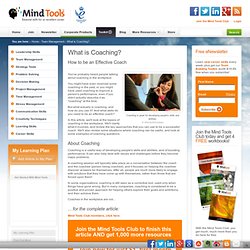
You might have even received some coaching in the past, or you might have used coaching to improve a person's performance, even if you didn't actually describe it as "coaching" at the time. But what actually is coaching, and how do you use it? In this article, we'll look at the basics of coaching in the workplace. The GROW Model - Coaching Training From MindTools. A Simple Process for Coaching and Mentoring Learn how to use the GROW Model, with James Manktelow & Amy Carlson.
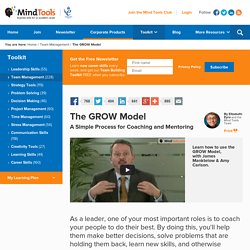
As a leader, one of your most important roles is to coach your people to do their best. By doing this, you'll help them make better decisions, solve problems that are holding them back, learn new skills, and otherwise progress their careers. Some people are fortunate enough to get formal training in coaching. USP Analysis - Problem-Solving Training from MindTools. The Unique Selling Proposition: Finding Your "Competitive Edge" Stand out from the crowd!
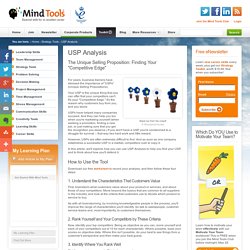
© iStockphoto/nicolas For years, business trainers have stressed the importance of "USPs" (Unique Selling Propositions). Your USP is the unique thing that you can offer that your competitors can't. It's your "Competitive Edge. " USPs have helped many companies succeed. However, USPs are often extremely difficult to find. Core Competence Analysis - Problem Solving Techniques from MindTools. Building Sustainable Competitive Advantage What makes you stand out from the crowd?
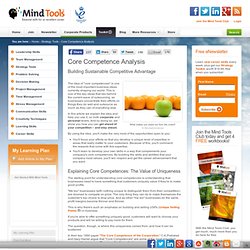
© iStockphoto/abzee The idea of "core competences" is one of the most important business ideas currently shaping our world. This is one of the key ideas that lies behind the current wave of outsourcing, as businesses concentrate their efforts on things they do well and outsource as much as they can of everything else. In this article we explain the idea and help you use it, on both corporate and personal levels. By using the idea, you'll make the very most of the opportunities open to you: You'll focus your efforts so that you develop a unique level of expertise in areas that really matter to your customers.
Keller's Brand Equity Model - Strategy Tools From MindTools. Building a Powerful Brand "Patagonia" is a trademark (see www.patagonia.com). We have no association or connection with this company. Content Marketing for Recruiters on Social Media. As a recruiter, what type of content should you be putting out online?

And what is your company doing to create interesting content for your target audience? Great content leads to a stronger brand online, both your personal brand as a recruiter and your company’s brand as an agency/employer. As our friends at CopyBlogger write: “Branding isn’t your company name. It’s not a tag line. The easy pieces of content to create include: Updates on Twitter, LinkedIn, FacebookPress releases (short news pieces)Blog postsWhite papers (typically a compilation of blog posts)Images (Instagram is a great place for this, as well as Flickr)Infographics (see below)Slideshows (try SlideShare for this)Video (try YouTube, Viddy, Vine or Instagram) The more advanced content will get more interest but also requires more effort:
PCS: IFG - Benne and Sheats Group Roles flashcards. The Leadership Process Model - Leadership Skills from MindTools. Taking an Intelligent, Long-Term Approach to Leadership This model highlights the dynamic nature of leadership. © iStockphoto/H-Gall Leadership is about setting direction and helping people do the right things.
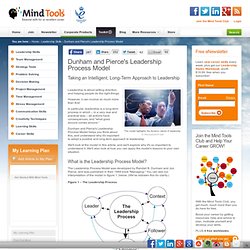
However, it can involve so much more than this! In particular, leadership is a long-term process in which – in a very real and practical way – all actions have consequences, and "what goes around comes around. " 10 Common Leadership & Management Mistakes - Leadership Skills from MindTools. Avoiding Universal Pitfalls Avoid common leadership and management mistakes. © iStockphoto/Laflor Experience is the name every one gives to their mistakes. – Oscar Wilde It's often said that mistakes provide great learning opportunities.
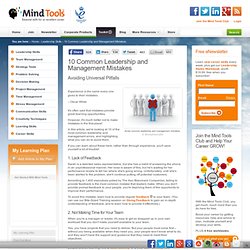
However, it's much better not to make mistakes in the first place! In this article, we're looking at 10 of the most common leadership and management errors, and highlighting what you can do to avoid them. If you can learn about these here, rather than through experience, you'll save yourself a lot of trouble! 1. Sarah is a talented sales representative, but she has a habit of answering the phone in an unprofessional manner.
According to 1,400 executives polled by The Ken Blanchard Companies, failing to provide feedback is the most common mistake that leaders make. SELF-IMPROVEMENT. The GROW Model - Coaching your team members to improve performance - Leadership training from MindTools. A Simple Process for Coaching and Mentoring Learn how to use the GROW Model, with James Manktelow & Amy Carlson.
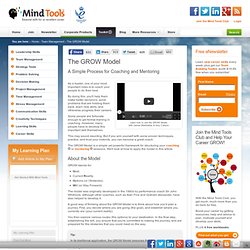
As a leader, one of your most important roles is to coach your people to do their best. By doing this, you'll help them make better decisions, solve problems that are holding them back, learn new skills, and otherwise progress their careers. Some people are fortunate enough to get formal training in coaching. However, many people have to develop this important skill themselves. This may sound daunting. The GROW Model is a simple yet powerful framework for structuring your coaching or mentoring sessions. About the Model GROW stands for: Goal.Current Reality.Options (or Obstacles).Will (or Way Forward). The Leader-Member Exchange Theory - Team Management Training from MindTools.
Getting the Best From all Team Members (Also known as LMX or Vertical Dyad Linkage Theory) Get the best from every team member. © iStockphoto/kycstudio As a manager, it's not always right to treat everyone on your team in the same way. French and Raven's Five Forms of Power - Leadership Training from MindTools. Understanding Where Power Comes From in the Workplace Lead at full power! © iStockphoto Leadership and power are closely linked. People tend to follow those who are powerful. And because others follow, the person with power leads. But leaders have power for different reasons. On the more positive side, leaders may have power because they're experts in their fields, or because their team members admire them.
Do you recognize these types of power in those around you – or in yourself? The Influence Model - Communication Skills Training from MindTools. Using Reciprocity to Gain Influence. Difficult Conversations: Nine Common Mistakes. Recruitment Selection. FYI For Insight™ - Korn/Ferry International. Test Yourself! Free high quality psychological tests at 123test.com. Team roles test - take this free team roles test online at 123test.com. According to team roles theory there are specific different team roles. These roles can be functional, organizational, personal or even skillful. Each team should consist of different team roles, depending on the specific goals the team wants to achieve. A team that does not have the ideal composition may run into problems. For example, a team consisting of only creative individuals will generate many ideas, but none of them will be implemented. A team consisting of only experts may lose sight of the big picture. Essentially, roles are equal to 'persona' (masks) or specific competency profiles and have been mentioned explicitly since ancient Greek history.
Personality styles, types, theories and psychometrics models, personality tests and quizzes theory. Home » self/personal development » personality theories, types and tests personality types, behavioural styles theories, personality and testing systems - for self-awareness, self-development, motivation, management, and recruitment Motivation, management, communications, relationships - focused on yourself or others - are a lot more effective when you understand yourself, and the people you seek to motivate or manage or develop or help.
Understanding personality is also a key to unlocking elusive human qualities, for example leadership, motivation, and empathy, whether your purpose is self-development, helping others, or any other field relating to people and how we behave. The personality theories that underpin personality tests and personality quizzes are surprisingly easy to understand at a basic level. This section seeks to explain many of these personality theories and ideas. Personal Goal Setting - Goal Setting Tools from MindTools. Education Competencies: All Competencies. Level 100: Microsoft Digital Literacy This curriculum, available both online and offline, helps educators develop a fundamental understanding of computers and productivity software.
These courses help them get the essential skills they need to begin computing with confidence. The Standard Curriculum features five courses that cover computer basics: Using the Internet, Using Productivity Programs, Security, Privacy and Digital Lifestyles. Professional and Career Development. Exponent offers a challenging environment for highly qualified and motivated individuals to develop their technical expertise and business acumen. We are looking for experienced professionals and new graduates to become the future Principals of Exponent. The information below outlines our consulting career path and demonstrates how you can establish and develop your future career at Exponent.